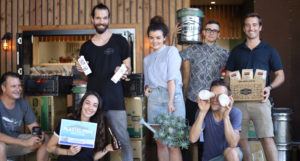As awareness and education around reducing plastic use improves, many of us are taking valuable steps in our own homes to cut back on the waste our families create. We take reusable shopping bags, store food in reusable containers, boycott purchasing overpackaged products and practice making bin liners with newspaper. However, when we go out, it can be more difficult to forego the usual plastic paraphernalia. Plastic cutlery and food containers, disposable cups, plastic bags and plastic straws are amongst the biggest offenders – we have all been guilty of accepting these from time to time.
Where many businesses would like to make impactful changes, unfortunately for many, time, money and resources prevent much tangible action. That’s where an incredible new initiative comes into play – Plastic Free Places, run by The Boomerang Alliance in partnership with the Australian Packaging Covenant.
Beginning with a hugely successful pilot program in Noosa, Plastic Free Places now includes Byron and Perth, with more councils and governments eager to get on board. The program is unique in that it works directly with local businesses, events and markets to remove single-use plastic altogether, therefore making earth-friendly choices much easier for both project members and the community they serve.
Kellie Lindsay is the Program Manager for Plastic Free Places and has been instrumental in getting the project off the ground from the very beginning. Kellie had been working with the Boomerang Alliance on the container refund scheme and bag ban in Queensland, before becoming involved in the Noosa Project. She now oversees the three current projects and works with other councils and governments across the country to promote and eventually implement the program into other communities.
“From doing the Noosa project, we soon realised that working with businesses, suppliers and the packaging industry to bring the project to reality was really complicated and difficult for a community to achieve without a managed program and dedicated staff,” Kellie explained.
“We presented our model at the ‘Beyond Plastic Pollution’ conference in 2017, and Byron Shire Council asked us if we could also run a project there for them. And from all of that we decided to create ‘Plastic Free Places’ – a comprehensive program that can be implemented by us in any community, in partnership with council and the community itself.”
Plastic Free Noosa now has around 180 events and local businesses signed up as members. Members who have eliminated six identified single-use plastic items (water bottles, straws, coffee cups/lids, takeaway containers, foodware (cutlery, plates, cups etc) and plastic bags – chosen because they are problematic and prolific in the litter stream – become known as ‘Plastic Free Champions’. Approximately a third of food retail members have achieved Champion status. Between February 2018 and June 2019, Plastic Free Noosa estimated that a staggering three million plastic items had already been removed from Plastic Free Champion cafes and restaurants. The annual Noosa Tri last year replaced 180,000 plastic cups with compostable ones, and arranged for them to be composted, and last year’s Noosa Food & Wine Festival saw 5.3 tonnes of food and packaging sent for composting rather than landfill.
Making these switches easy is the driving force behind Plastic Free Places, as Kellie says many business owners do want to implement changes, but barriers to transition such as not knowing where to start, product greenwashing, time constraints, lack of knowledge about product choices and financial cost often prevent this.

“Having us be able to go into the business, look at the products they’re using, find alternatives and solutions that work for them, identify where they can get them and how to reduce costs is valuable as it allows them to make the changes without the process taking up too much time or being overwhelming,” Kellie said. “Behind the scenes, we spend a lot of our time keeping up with the packaging industry and working with suppliers and manufacturers to make this straight forward for our members.”
“Many cafes become advocates for the program and encourage other businesses to get on board as well, so it’s generally very positive,” she said.
From a consumer perspective, having local businesses offering plastic-free alternatives allows each of us to continue making a difference, even when we are outside our homes. Changing habits can be difficult, but having local businesses on board helps provide additional solutions to everyday plastic-free living, as well as opens up dialogue within the community regarding environmental issues. It also helps keep momentum for those who struggle with consistency.
“I think most people are now aware of the problem, but changing habits is hard. I think many people appreciate having plastic free options when they go out to dine and that’s an easy way for people to make a difference,” Kellie said.
As a consumer, Kellie urges everyone to support businesses that are taking steps to reduce plastic use. By putting our money where our mouth is, we can all encourage greater action within our community.
“The best thing to do is to support businesses who are making changes and reducing plastic. Choose to spend your money there and tell them you appreciate what they’re doing, and recommend them to others. Bring your own coffee cups, water bottles, straws, containers, bags etc and refuse single-use plastic. Spread the word, go on social media and participate in conversations in the community about reducing plastic,” she said.
“Without the community wanting change, the cafes have less motivation. Remember, it’s much easier for a cafe to keep using plastic, they must want to change, and they listen to their customers!”
Any community in Australia can become a Plastic Free Place – head to the Plastic Free Places website to find out how.





